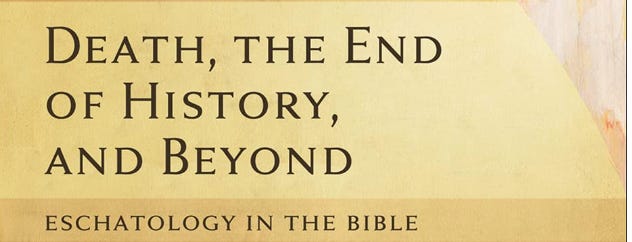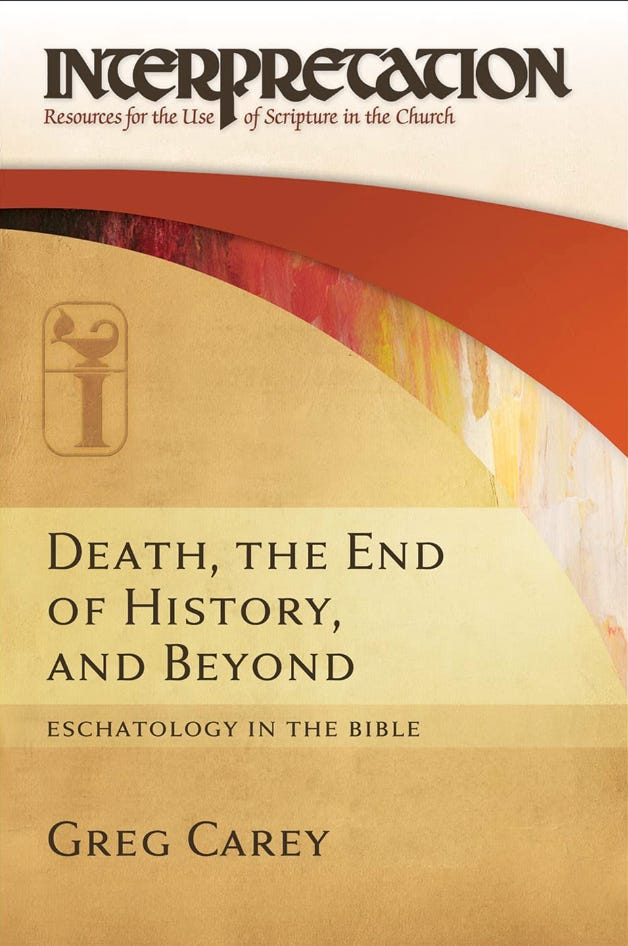Without Curiosity, We’ll Never Learn
Not a few of our contemporaries think Jesus as a cloud rider, or a rapture, or a millennium, or or or are more than a modern can embrace as a material reality. But much of what Christians have believed about eschatology is wrapped up in trans-material realities. Are they as credible today as they were at one time?
Greg Carey turns to remind us Bultmann’s famous approach to eschatology, which he called “demythologizing” but without erasing NT apocalyptic from theological value. Carey takes this on in his excellent new book, Death, the End of History, and Beyond: Eschatology in the Bible.
Carey’s approach is not to dismiss but to ponder, to ponder and to think anew, to think anew in ways that draw deeply from the wells of powerful eschatological literature in the Bible and the Jewish world. His is an exercise in constructive theology but he has moved beyond classic literal approaches.
In reading what the Bible says about eschatology, both individual and cosmic, he examines in four categories and Greg tosses in insight after insight as he moves along.
First, so much of prophetic, apocalyptic, and eschatological sections in the Bible are a form of the poetic (not always strictly poetry, per se). When someone writes poetically, language shifts into images and symbols and allusions. It works at the level of evocation and affectations. It is not to be read literally, and this makes a massive difference. Carey has a powerful set of paragraphs about how poetic 1 Thess 5:1-11 is. Much evocative imagery.
Second, this literature was written to “change people’s opinions, sensibilities, or patterns of behavior.” This does not squelch its imagery or its intentions for the future, but there is an ethical, moral level to this literature that needs to be appreciated to read the literature well. Always, we could say, look for what the author is trying to do with the readers.
Third, one of the Bible’s and Jewish literature’s most noteworthy features of eschatology is the author’s creativity. These authors know the prophets before them, grab an image or five, and adjust and expand and shift and supplement, and then they give that image new life. Just read Ezekiel’s use of the temple and the Book of Revelation’s use. Instead of squeezing Ezekiel into John, to use my professor’s language, let John be John (or the author the author). I have a section on how John’s imagination worked in Revelation for the Rest of Us. It is one of the most electrifying elements of reading the book well. When the Lion of Judah becomes the Lamb of God in Revelation, we’ve got some serious image shifting. Would it be code-switching?
Fourth, the author of eschatological materials can suddenly move into sophisticated scribal attentiveness to detail.
Add to these the diversity of the Bible’s own ideas about eschatology. Yes, there was development over time but Carey’s not so sanguine on the progressive revelation idea. Instead, each author spoke in each author’s day in each author’s way. You may not know about this, but I remember it from my own seminary days: Did Paul change his own mind? From thinking he’d be alive when Christ returned (say 1 Thess) to believing he would not be alive (say 2 Cor)?
Add to these, in order to understand each of the points already made, the need to anchor texts in both social and historical contexts. The idea is already at work in what we have written above.
But, one of the stretching points for many is the important connection between the Creation story of Genesis with the eschatological images of the kingdom, the eschaton --- easily reduced to Creation and New Creation. One can’t read the end of Revelation and not see the garden scene of Genesis 1-3. Not possible. There is continuity between Then and Then.
To read eschatology literature in the Bible requires a willingness to be surprised and lifted up into imagination; faithful readers are surprise-able readers. Greg ends this chapter with a lovely set of words: “Without assumptions, we cannot understand; without curiosity, we’ll never learn.”




Helpful. And I see that you, Scot, are interviewed on the Holy Post Podcast, that just downloaded, regarding Revelation. Looking forward to listening to that as well.